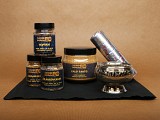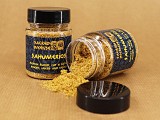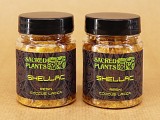Resin, Cut & Sifted, 60 Ml, 35 Gr from Indonesia (SKU 3837)
Canarium strictum exudates a resin called as ‘Sambrani’ or ‘Dammar’ which has many commercial uses. Its usage among tribal and folk people in different parts of India has been explored through ethnobotanical studies. High quality, small sized grains of yellow Dammar resin. More information can be read below.
Packed in 60 ml clear plastic pots containing 35 gram.
Canarium strictum exudates a resin called as "Sambrani" or "Dammar" which has different uses. Its usage among tribal and folk people in different parts of India has been explored through ethnobotanical studies. It finds its usage in incense and varnish industries[1] and also used as a substitute for burgundy pitch in making plasters.
Sacred Incenses. We offer a unique collection of the rarest plants that are used as an incense for ceremonial purposes. A carefully selected range of the finest incense herbs, woods, resins and incense mixtures from around the world.
Our packaging is small, and the textures of our incenses and blends are very fine. They come in the form of powder, fine grained cut and sifted grains of leaves, flowers, wood or resin. This fine-ness allows for precise blending of your personal mixtures, and allows for subtle application in a small and dedicated setting. This collection offers a great palette of fragrances to create a beautiful setting for an inner journey or ceremony.
Other names: Canarium strictum, Karunkungiliyam, Karangkunthrikam, Pantham, Pantappayan, Thelli, Viraka, Thellippayin, Nalla rojanamu, Black dammar, Doopa.
It is used in foods, as either a clouding or a glazing agent, in the making of incense, varnishing and in other processes. Damar was first introduced as a picture varnish in 1826 and is commonly referred to as Damar varnish.
Canarium strictum, Burseraceae (Copal family) is a large canopy tree with bipinnate leaves that is distributed across parts of India, Myanmar, and Yunnan province, China. It can grow up to about 40 meters tall and is found in moist deciduous to semi-evergreen forests at altitudes ranging from about 750 to 1400 meters. Trees are polygamous and flowers are insect pollinated. Fruits are ovoid or ellipsoid drupes with one to three seeds. Seed predation has been reported to be very low (1%). Canarium strictum sheds its leaves during the months of December and January, and it is reported to be a late-secondary forest species.[2]
Harvesting and Resin Collection Methods: Wide variation in the harvesting pattern and resin collection has been observed and three modes of resin collection have been documented for Canarium strictum.[2] The first type involves the collection of resin formed naturally through fissures on the tree. The second type of resin collection involves making incisions to promote resin flow. This method is largely employed by harvesters. They make incisions with curved iron knives and collect the resin exuding from the incisions. The third type of resin-collection strategy involves setting a low fire at the base of the tree followed by incisions and resin collection. The species is a rich source for Sambrani which is used to cure various bronchial ailments.
Black dammer resin contains junenol, canarone and epikhusinal. The plant contains a sesquiterpene keton: canarone.
In aromatherapy, burn Dammar Gum resin to help contacting the angelic realm.
[1] J. Augustine, P.G. Krishnan, Status of the black dammar tree (Canarium strictum Roxb) in Periyar Tiger Reserve, Kerala and the uses of black dammar, Indian Forester, 132(10), 2006, pp. 1329–1335.
[2] A. Varghese, T. Ticktin, Regional variations in Non Timber Forest Produce Harvest strategies, trade and Ecological Impacts: The case of Black Dammer (Canarium Strictum, Roxb) Use and Conservation in the Nilgiri Biosphere Reserve, Ecology and Society, 13(2), 2008, 11.
[3] R. Kannan, Burning out the black dammar, Canarium strictum Roxb., Bombay Journal of Natural History, 91(1), 1992, p.159.
This is a natural product, used as incense or in perfumery, or as an ingredient of incense and other perfumery or potpourri preparations.
Some incense plants or products may have some history of other folklore purposes, but we offer this product for its use as incense. Not food grade, not for consumption.
Please read our Terms & Conditions before placing your order.















